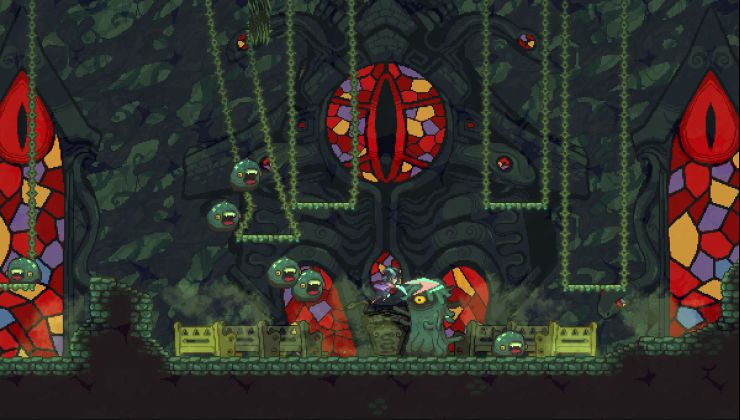Back in October 2019, the GNOME project announced they had been hit by what they called a patent troll with Rothschild Patent Imaging. Now it seems it has been resolved and it's a big win for open source.
The problem was with the Shotwell image management application, as Rothschild claimed it infringed on their patents. Yesterday, GNOME announced a "walk-away settlement" that not only drops the case against GNOME but both Rothschild Patent Imaging and Leigh Rothschild in the case will now grant a "release and covenant" to any software released under an OSI (Open Source Initiative) approved license which covers the entire Rothschild portfolio of patents. That's a nice win for FOSS developers.
From the GNOME press release:
Neil McGovern, Executive Director for the GNOME Foundation said "I’m exceptionally pleased that we have concluded this case. This will allow us to refocus our attention on creating a free software desktop, and will ensure certainty for all free and open source software in future."
Leigh Rothschild said "I’m pleased that we have managed to settle this issue amicably. I have always supported the innovation of open source software and its developers and encourage its innovation and adoption."
As an added bit of info, OpenUK spoke with GNOME's McGovern in The Register, where they mentioned that it covers over 100 patents. This is thanks to a crowdfunding campaign GNOME did that helped to raise over $150K for the defence.
Last edited by Khoi on 21 May 2020 at 7:03 pm UTC
It's great to see that they won, especially because they even got permissions for all of the other patents.
... and not only them if I don't get it wrong!
Seems this company wanted to make sure their patents are not used by commercial big players, and realized there is little gain not providing it for open source since it helps adoption. Restricting would mean they just do not support it.
I still struggle with patents overall, I still think they prevent innovation. But a kind of deal where they are free to use for free software but not commercial products, well... I understand that very well. If someone wants to make money using your innovations.. though, that's not the OSS paradigm... it's fine for me.
We see all the open source development bringing big business to global players. Not a bad thing if they fund it too, which for some projects is true. For many it isn't.
But I think we live in times where the paradihm shifts. And we'll see more of it. For the better or worse, we can't say yet.
150k for over 100 patents does not sound a lot. It isn't. The walk away settlement speaks of that.
Seems this company wanted to make sure their patents are not used by commercial big players, and realized there is little gain not providing it for open source since it helps adoption. Restricting would mean they just do not support it.
...
Don't forget the high risk of having their patent invalidated. In general, patent trolls go for the (seemingly) weaker guys to scare them into settling, so they can later go after bigger players with all those settlements under their belt to convince them to follow suit.
This, of course, does not work if the "weak guy" unexpectedly shows some (legal) claws, so it is no surprise the company settled, especially when gnome went for their throat by aiming for invalidation of the patent in question.
Imo, this deal is *not* good news; it let the patent troll get away with their patent intact, showing that open source projects can be a source for these kinds of settlements (notice that the gnome press release of the deal conspicuously neglects to explicitly mention whether the patents in question should have been invalid in the first place). This will unnecessarily drain resources and peace of mind from the projects that get threatened, not to mention the risk that some of them could decide not to risk the financial drain and close down.
Last edited by emphy on 22 May 2020 at 3:52 am UTC
* It makes very bad press to attack open source
* They fight tooth and nails
* Rothschild is going to loose. Big.
Because in the end, all these patents were granted _illegally_. There cannot be patents on algorithms, and its only because of a totally false and non-scientifc view of what an "algorithm" is within the patent law community.
And nobody who has any software patents wants to fight anyone who will do its utmost to change that wrong assumption that "algorithms are not math" (yes, really, that is the base of software patents) and thus invalidate each and every software patent.
Last edited by Seegras on 25 May 2020 at 5:23 am UTC
150k for over 100 patents does not sound a lot. It isn't. The walk away settlement speaks of that.
Seems this company wanted to make sure their patents are not used by commercial big players, and realized there is little gain not providing it for open source since it helps adoption. Restricting would mean they just do not support it.
I still struggle with patents overall, I still think they prevent innovation. But a kind of deal where they are free to use for free software but not commercial products, well... I understand that very well. If someone wants to make money using your innovations.. though, that's not the OSS paradigm... it's fine for me.
We see all the open source development bringing big business to global players. Not a bad thing if they fund it too, which for some projects is true. For many it isn't.
But I think we live in times where the paradihm shifts. And we'll see more of it. For the better or worse, we can't say yet.
Software patents should never have been allowed by the USPTO in the first place. The only thing that saved the US software industry from total collapse was that no one in the industry really understood that there where such a thing as software patents until very late, if this had been found earlier then we would most likely still be left in the pre MS-DOS days still.
And take not just my word for it, here is a direct quote from Bill Gates himself in a 1991 internal Microsoft memo:
If people had understood how patents would be granted when most of today's ideas were invented, and had taken out patents, the industry would be at a complete standstill today.
I feel certain that some large company will patent some obvious thing related to interface, object orientation, algorithm, application extension or other crucial technique.
If we assume this company has no need of any of our patents then they have a 17-year right to take as much of our profits as they want. The solution to this is patent exchanges with large companies and patenting as much as we can. Amazingly we haven't done any patent exchanges that I am aware of.
Amazingly we haven't found a way to use our licensing position to avoid having our own customers cause patent problems for us. I know these aren't simple problems but they deserve more effort by both Legal and other groups. For example we need to do a patent exchange with HP as part of our new relationship.
In many application categories straighforward thinking ahead allows you to come up with patentable ideas. A recent paper from the League for Programming Freedom (available from the Legal department) explains some problems with the way patents are applied to software.[1][2][3]
150k for over 100 patents does not sound a lot. It isn't. The walk away settlement speaks of that.
Seems this company wanted to make sure their patents are not used by commercial big players, and realized there is little gain not providing it for open source since it helps adoption. Restricting would mean they just do not support it.
I still struggle with patents overall, I still think they prevent innovation. But a kind of deal where they are free to use for free software but not commercial products, well... I understand that very well. If someone wants to make money using your innovations.. though, that's not the OSS paradigm... it's fine for me.
We see all the open source development bringing big business to global players. Not a bad thing if they fund it too, which for some projects is true. For many it isn't.
But I think we live in times where the paradihm shifts. And we'll see more of it. For the better or worse, we can't say yet.
Software patents should never have been allowed by the USPTO in the first place. The only thing that saved the US software industry from total collapse was that no one in the industry really understood that there where such a thing as software patents until very late, if this had been found earlier then we would most likely still be left in the pre MS-DOS days still.
And take not just my word for it, here is a direct quote from Bill Gates himself in a 1991 internal Microsoft memo:
If people had understood how patents would be granted when most of today's ideas were invented, and had taken out patents, the industry would be at a complete standstill today.
I feel certain that some large company will patent some obvious thing related to interface, object orientation, algorithm, application extension or other crucial technique.
If we assume this company has no need of any of our patents then they have a 17-year right to take as much of our profits as they want. The solution to this is patent exchanges with large companies and patenting as much as we can. Amazingly we haven't done any patent exchanges that I am aware of.
Amazingly we haven't found a way to use our licensing position to avoid having our own customers cause patent problems for us. I know these aren't simple problems but they deserve more effort by both Legal and other groups. For example we need to do a patent exchange with HP as part of our new relationship.
In many application categories straighforward thinking ahead allows you to come up with patentable ideas. A recent paper from the League for Programming Freedom (available from the Legal department) explains some problems with the way patents are applied to software.[1][2][3]
Agreed. The USPTO failed everyone by declaring software code to be patent-able though it should be no more patent-able than logic or math --- because that's really all it is. The very idea of software patents is entirely unsound, unethical, and socially irresponsible. I believe this and I urge others to consider it as well.
Regardless of whether anyone agrees with my stance or not, there can hardly be an arrangement of legal or moral reasoning invoked in which the creature known as the patent troll can be understood as anything but deeply sociopathic and entirely parasitical, its sole raison d'être being to feed off the creativity and labour of others. I'm glad Gnome won and that their victory involved this particular troll relinquishing some psudo-property into the open-source reality, but the troll still drools and breathes to sling shite upon other hapless souls.
Last edited by Nanobang on 22 May 2020 at 2:27 pm UTC
And I dislike patents specifically on software almost as much as I dislike patents on existing genomes (really, on those, WTF?! You didn't invent it you stupid prat, you just had some techs run a sequencer). I'm not convinced that the "it's math" thing matters very much, but the structure of how software works socially and economically makes patents particularly damaging to it.
But even if we accept all that stuff I sometimes wonder whatever happened to the original requirements for patenting: A working model and disclosure of the specs, so that others can make improved models based on it. Nowadays apparently it's enough to have some vague verbiage that can barely even be called "concepts", and you don't have to show jack even if you have it. Transforms the way it works massively, and not for the better. Patents no longer reward actual inventors (if they ever did), they instead reward bullshit artists . . . or more specifically, they reward people with the money to hire professional bullshit artists who bill $$$$/hour to submit carefully vetted patent applications.
To sum up, that company first attacked Gnome, then withdraw their complaints, and then need to be praised?
Nope.
I'm glad Europe (still) does not recognizes patents on ideas, not realisations.
I'm glad Europe (still) does not recognizes patents on ideas, not realisations.
In theory. The European Patent Convention (EPC), Article 52, paragraph 2, excludes from patentability, in particular
1. discoveries, scientific theories and mathematical methods;So how come there are more than 100'000 software patents? http://techrights.org/wiki/index.php/Software_Patents_in_Europe
2. aesthetic creations;
3. schemes, rules and methods for performing mental acts, playing games or doing business, and programs for computers
4. presentations of information.
Well, they've all been granted illegally. And are not enforcable, because of that. Of course some entitites like to change that..
But the point is, the European Patent Office did act criminally.
However, the EPO is not part of the EU, it's an agreement to which also non-EU members like Switzerland are part. And the EPC never specified a court to which the EPO should be liable. The only thing one could do in light of this criminal behaviour, is to terminate the EPC unilaterally. If enough states just would threathen to terminate the EPC because of the illegal patents, that would probably also work.
In the meantime, the EPO continues to grant illegal patents and be a bad place to work (well, no judical oversight, this applies to labour-issues too): https://www.politico.eu/article/labor-relations-turn-toxic-in-the-european-patent-office/








 How to set, change and reset your SteamOS / Steam Deck desktop sudo password
How to set, change and reset your SteamOS / Steam Deck desktop sudo password How to set up Decky Loader on Steam Deck / SteamOS for easy plugins
How to set up Decky Loader on Steam Deck / SteamOS for easy plugins
See more from me